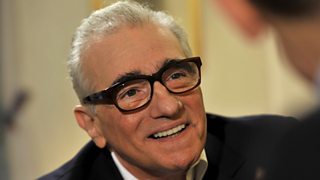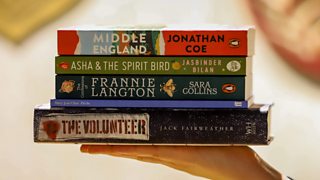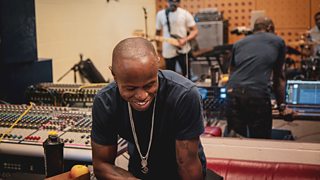Five risks taken for art
As part of Front Row's exploration of artistic risk, we asked artists and arts producers from across the art world about the biggest risk they took in their career. What did it involve, why did they do it, and was it worth it?
Jeremy Deller - artist
Artist Jeremy Deller explains the risks involved in creating The Battle of Orgreave, his 2001 re-enactment of the violent confrontation between miners and police during the miners’ strike in 1984.
The risky element to it really was that we were doing a live event that was a reconstruction of a riot. So how do you reconstruct a riot? How do you reconstruct chaos? It doesn’t really make sense.
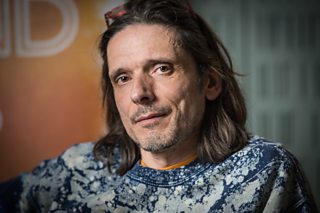
Things did go wrong but that just caused chaos and confusion and made things better
We had a rehearsal the day before and people were very worried, especially the reconstructors, because we recruited from re-enactment societies but there were former miners and their families who were also re-enacting with us. Even though the reenactors were in the majority they were absolutely terrified that the miners would basically take over this event and create a real riot and some sort of revolutionary moment.
There’s the anxiety around how do you make something look good with a thousand people when the original was ten thousand people maybe? How do you do it justice without it looking comical? Because there’s always a risk when you do things that it will be absurd. I mean, there’s an absurdity in the idea but also it had to have a resonance and not be comic. It could have been very Monty Python really.
Then, once it starts, you have no control over this thing. It could get out of hand; it could get truly violent; people could get hurt. All it takes is one person to do something that they’ve not been told to do and that can get out of hand and things can proliferate. So you really don’t know what will happen next, which in a way is great because that’s what happens in a riot really.
Things did go wrong and the timings were out in terms of the re-enactment, but that just caused chaos and confusion and that just made things better. If everything had gone to plan then it would have probably not been as good. Because there were mistakes made and people popped up in the wrong place at the wrong time it gave an edge to it and an unexpected quality to it.
There was no physical violence visited upon the reenactors by the former miners. The former miners actually performed, or re-enacted their lives in a way that was so close to being a riot in a way, but with so much emotion that it really shocked the reenactors.
I think a lot of [the former miners] were quite moved by being part of it, but then so were the reenactors. They wrote a lot of letters afterwards saying they had never experienced such an atmosphere at a re-enactment and they were just absolutely blown away by it. Some of them even wrote saying their views of the miners and the miners’ strike had changed because they got to meet some miners, finally. Having thought they were “the enemy of the people” (as they were described at the time) they realised they were just working men like themselves.
It was absolutely a risk worth taking. It was the piece of work that gave me an upgrade in terms of the art world and made me basically. I always say it’s my Stairway to Heaven: it’s the thing I’ll be remembered for, so it was a very important piece of work for me personally.
Sharmaine Lovegrove - publisher
Publisher Sharmaine Lovegrove on the personal risk of setting up Dialogue Books, her imprint which publishes authors from under-represented communities, including writers from LGBTQI+, BAME, disability and working class backgrounds.
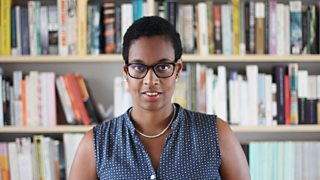
Rather than helping me, people would talk to me about the fact that it was unlikely to succeed
I think the most difficult thing in setting up the imprint was knowing that my personal taste and my ability to get this right and choose really brilliant books was often under scrutiny.
I think for a lot of my colleagues and in the wider industry it was really, really challenging for them to understand how someone who hadn’t worked their way up in a traditional sense could succeed, and so rather than helping me then people would talk to me about the fact that it was unlikely to succeed and it was likely to fail and how difficult it all is.
The personal risks have been really putting myself at the front and centre of a discourse that’s so personal. The question of whether or not people of colour can read or will read or will buy books or can write: you’re talking about my friends and my family and my ancestors, and you’re talking about an entire body of people as if we’re sort of insignificant. I think the personal risk of being one of the few black people in the industry is that it really hurts to see that level of racism and ignorance and prejudice on a day-to-day basis.
So the personal risk has been more around mental health: staying sane and staying passionate and having utter conviction and trying to convince people who question whether people like you can even exist. It’s such an odd place to be. I’m kind of a purist – I’m really here for storytelling, I’m really here for writers – but being centred in the narrative of change means that my personality is sometimes looked upon as being central to what we’re doing. Actually I’d prefer to step away from the limelight to allow my authors to speak, but I’ve understood the importance of my voice, and that can be quite conflicting and so therefore it’s a personal risk. It’s a risk that’s led to me moving from my home city of London to another part of the UK so that I could just have a bit more space.
I am really proud of being a black publisher. I’m sad that I’m the only black publisher in corporate publishing, but I’m proud of my understanding of what great storytelling is. If storytelling wasn’t so transformative on a personal level then I don’t know that it would be worth it. But I spend a lot of time thinking about five-year-old me, and eight-year-old me, and 16-year-old me, and 25-year-old me. I’m always thinking: "If you don’t do this then the people who are like you who don’t have this opportunity, then they won’t have the opportunity either," and that’s why I always see it as bigger than myself.
Richard Armitage - actor
The actor Richard Armitage shares the physical and reputational risk of being waterboarded during filming for an episode of Βι¶ΉΤΌΕΔ One drama Spooks.
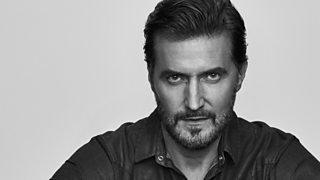
I walked into it as a bit of a hero and I walked away from it feeling that it was probably something that I shouldn’t have done
One of my greatest career risks was something physical. It was a moment in Spooks. I was playing a character called Lucas North, and the character had to be waterboarded. Right at that moment in the media there was a big conversation happening about whether it was considered torture to waterboard somebody and I’d done a lot of research on it.
We decided with the stunt team that I would attempt to receive the full shebang of what the waterboarding might be, largely because I wanted to make sure that the effect of it looked real and not faked. I’m quite terrified of water, so how stupid of me to think that something like that would be worth doing on film. But again it’s that thing of I want everything to seem so real on camera and I wanted my reaction to be real; I didn’t want to have to act it.
So we set it up, obviously it was all to be handled safely, and I think I managed about three or four seconds of being waterboarded before I pulled the towel from my face. It was terrifying; it was panic inducing. At one point I think I was going to be tied down to the bed but I said I have to be able to have my hand free so that I can get out of it if I need to. But yes: it’s like drowning.
I think [I was probably a bit naïve about] the reputational risk of doing the waterboarding. I don’t remember instigating the idea – it was offered to me as, "Do you want to try it or not?" and I said: "Yes".
It was picked up in the media so it became more of a thing than it was on the day. We didn’t do it so that we could shout about it and say, "Look at this actor; he’s a method actor," and all of that stuff. Had I not been me reading about me in the paper I would probably have just rolled my eyes and said: “Why don’t you just act it, Armitage? Why do you need to go through that?” It is a bit insensitive to the people that suffer it.
On a personal level, if I weren’t an actor, I would say I’m glad that I know what it feels like now because I can definitely say that it is torture if someone’s subjected to that for a long period of time. I would say that’s definitely torture.
I wouldn’t say that I regretted it but I did feel like I’d walked into it as a bit of a hero and I walked away from it feeling that it was probably something that I shouldn’t have done. It isn’t something to be taken lightly and I suppose on a personal level, physically I was prepared to take the risk. Professionally, I did feel like a little bit of a silly actor for doing something like that, which would have been perceived as a stunt to bring attention to it. But in retrospect, years later, I look back and think that I’m actually quite glad that I know what that feels like.
The one tool that we have as actors and as human beings is empathy and the ability to understand what someone else is being put through. So on a personal level I’m glad I did it, on a professional level it probably wasn’t worth the risk.
Kerry Hudson - writer
Kerry Hudson speaks about the emotional risks of writing her memoir Lowborn: Growing Up, Getting Away and Returning to Britain’s Poorest Towns.
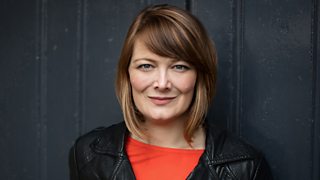
I felt quite frightened that I was going to be stripped of all the accomplishments and confidence of my adulthood
Lowborn is essentially an exploration of my own experience growing up in poverty in the '80s and '90s. People have said it’s "no-holds-barred", which I think is a polite way of saying that it’s very unflinching. It’s a very honest memoir. At the same time it also looks at what those communities that I grew up in are like now. So from Aberdeen all the way down to London, looking at whether things have got better, whether things have got worse.
A huge part of the risk was in possibly discovering things that I did not want to discover about my past. Part of the process was sort of being an archivist of my own life, or being a private detective about my past. So I requested my medical documents, my child protection documents from when I was quite young. I went back to towns that I had really, really unhappy memories of. All in all, I spent nine months on this weird knife edge, trying to discover these things, not really knowing if I wanted to discover them.
I was very afraid of exposing myself. I left my community and moved down to London when I was 20, 21 and I’d spent almost two decades trying really had to fit in. In the book I compare it to wearing a costume. I was also very aware of the strain that it takes to move through worlds being not completely, authentically yourself; leaving effectively 20 years of your life hidden from everyone who you know, almost. So I was very afraid of people finding out about my background and judging me.
Emotionally it was extremely risky because, as with any memoir, but especially one which talks about traumas from your childhood, you have to go back to places and relive them almost. Great Yarmouth was a particularly difficult place to revisit because I’d been there in my teens. So first of all I had quite fresh memories. I’d experienced sexual assault there; I’d had really poor mental health there; I’d really pushed myself to the limit of self-destruction in many ways while being really desperate to get out and feeling that there really weren’t any avenues for me to do that.
And it was so fresh that when I went back I felt quite frightened that I was going to be stripped of all the accomplishments and confidence of my adulthood and just be pulled straight back into that world.
But going there turned out to be one of the more positive aspects because I went there and felt like a grown woman who’d accomplished what she wanted to and who’d made a really good life for herself. So if it’s a novel about putting your ghosts to rest then Great Yarmouth was very much the place that I did that.
Jasmine Lee-Jones - playwright
Writer and performer Jasmine Lee-Jones speaks about the risks she felt writing her play, seven methods of killing kylie jenner, which was performed at the Royal Court Theatre in 2019.
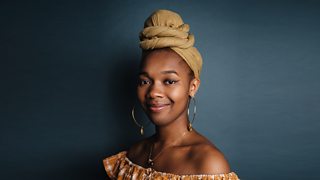
I did feel a risk of misrepresenting black women because I knew how rare it was to see black women on that stage
I did feel a risk of misrepresenting black women because I knew, and was made very aware of, how rare it was to see black women on that stage in comparison to our contemporaries. I did feel that risk because of the scarcity and rarity of it, so I knew that keenly.
Then I had a conversation with another playwright about it, and she said, “Why on Earth would you try and represent – don’t know how many black women there are in the world, never mind London – but why would you do that? You’ve just got to do those two characters." That was really liberating and I knew that and I just had to write.
There were definitely difficult, divisive topics in the play. So, for example, colourism – it’s so divisive. Even in our rehearsal room it just brings so many things to the fore. And I rewrote the scene where colourism is primarily referenced a couple of times. That was a contentious theme. The theme of cultural appropriation – what is it? I never actually say those words in the play – also a contentious theme. The question really is about capital and who gets to borrow from certain cultures. So that was contentious.
When I said “theatre should always be dangerous” at the Evening Standard Awards, first of all it’s an examination of the word danger, because we have to examine what is truly dangerous. It’s not dangerous for an old white person, or particularly an old white man, to go on stage shouting racial epithets. What’s that doing? I don’t think it’s really doing anything and I don’t think that’s dangerous. There are loads of films like that; I don’t think it’s doing any work; it’s not doing anything tangible.
What is really dangerous is, in fact, the Royal Court’s decision to give a playwright who’s not written anything a production; to empower two younger theatre artists, and give space in that theatre with the resources that has. That is actually dangerous.
I think the risk of writing this play, in many ways paid off. In some parts, last year was a very difficult and at times horrible time because I had no idea how it was all going to come together. There was a point where I was sat in an office in school getting told off and I was like, “Okay, I’m just not going to graduate” or this is going to be terrible.
It was tough coming into myself as an artist because I had to realise there will be times where I have to go with my instinct about what’s more important and I had to decide that this play was more important, not because it was about me but because I had to make it the thing it could be.
More from Front Row...
-
![]()
Front Row Risk
Hear more from Front Row's Risk season.
-
![]()
Martin Scorsese special
An extended interview with Martin Scorsese.
-
![]()
Costa Book Award Winners
Learn more about the year's winners at the Costa Book Awards.
-
![]()
What a music director does
One of the best in the business explains.

